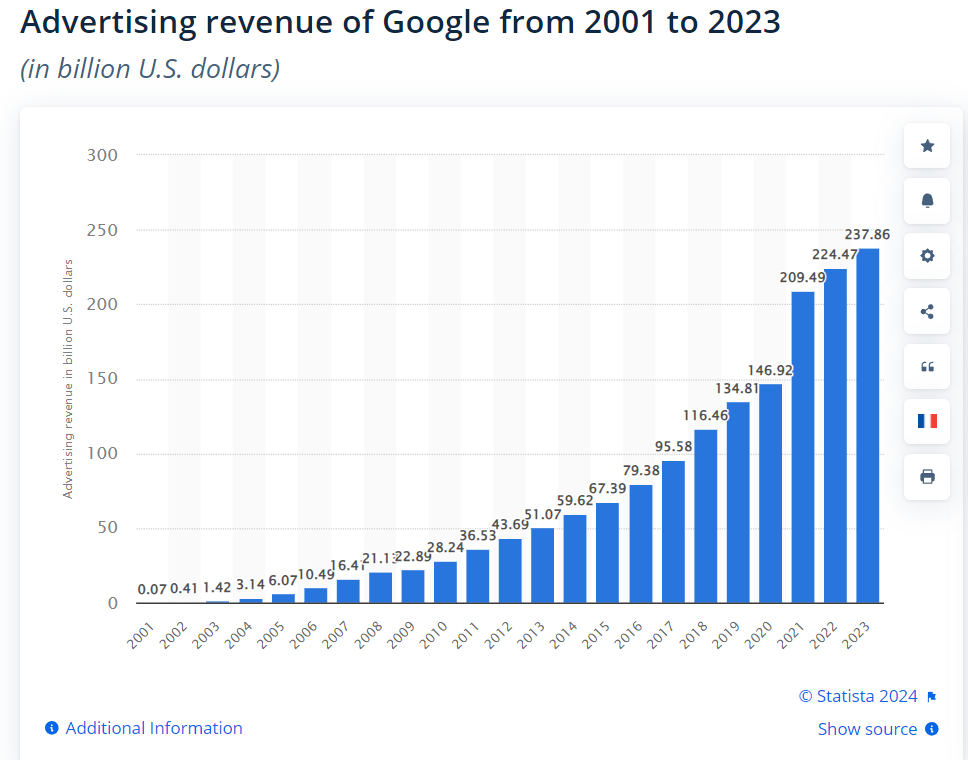Google, the digital giant owned by Alphabet Inc., is presently embroiled in a major court dispute in the UK that could fundamentally change the online advertising market. This lawsuit is a historic one. Google is accused of causing publishers of applications and websites in the UK to suffer large financial losses by abusing its market dominance in online advertising. In this instance, damages can total £13.6 billion ($16.9 billion).
Background
Amidst widespread criticism of Google's adtech business practices, the Ad Tech Collective Action filed a significant set-preferring abuse lawsuit in the UK against the company. The case builds on previous enforcement actions, including an ongoing competition lawsuit in the US and EU and a 2021 fine of €220 million for Google's self-preferring. Part of a global effort, the UK lawsuit accuses Google of engaging in anticompetitive behaviour and controlling the digital advertising market, which the plaintiffs claim have negatively impacted publishers' bottom lines.

Key Allegations Against Google
The lawsuit revolves around claims that Google has acted in a way that inhibits competition and innovation in the ad tech sector through anticompetitive behaviour. The particular assertions consist of:
- Exclusionary Practices: Google is charged with monopolising the ad tech market by erecting obstacles to rivals' entry and growth.
- Preferential Treatment: It's said that the internet behemoth gives preference to its own offerings, undermining rivals and publishers.
- Acquisition Strategy: It is asserted that Google's acquisition strategy neutralises challenges to its hegemony.
The Defence
Google has vigorously refuted the accusations, claiming that the case is incoherent and does not show how the company's actions have directly cost publishers money. According to the company, it has had a procompetitive effect on the ad tech sector, creating an environment that is advantageous to all parties involved.
The Possible Effect of the Lawsuit
The key information and statistics that follow highlight the potential effects of the UK case against Google over its advertising practices:
Financial Impact: Google is being sued in the UK and EU over claims that it engaged in anticompetitive behaviour in the digital advertising sector. Damages in the amount of €25 billion are being claimed.

Market Share: With a market share of more than 90% and revenue of 237.86 billion dollars., Google dominates the online advertising industry. One of the main elements of the accusations of anticompetitive behaviour is this dominance.
Publisher Revenues: According to an economic analysis, Google's abuse of the market may have resulted in a 40% decline in publisher ad revenues in the UK. This suggests that Google's policies have a big influence on publishers' profits.
Prior Penalties: Google was fined €220 million by the French competition authorities for identical crimes last year.
Legal Precedent: The outcome of this lawsuit could set a precedent for government enforcement efforts against other internet giants engaged in digital advertising as well as future antitrust investigations.
Historical antitrust cases
The case emphasises how crucial it is to have a just and competitive digital advertising market so that publishers and advertisers can prosper without having to deal with monopolistic tactics. All parties involved may benefit from a more balanced ecosystem as a result of the case's outcome. The following are some past instances of antitrust cases that have affected the largest tech companies:
Microsoft (1998):
Case: Microsoft was the target of a historic antitrust lawsuit filed by the US Justice Department in 1998.
Allegations: Microsoft was accused of participating in anti-competitive activity in order to monopolise the market for PC operating systems.
Result: As a consequence of the litigation settlement, Microsoft's commercial practices were limited. While the total number of patents increased, the number of new items and market entrants remained relatively constant, and overall market earnings decreased.
IBM (1960s–1970s):
Case: IBM was accused of controlling the computer industry, with estimates putting its market dominance as high as 70% in the 1960s and 1970s.
Results: In the end, the complaint was dismissed, and IBM made it through the court battle.
Bell System Monopoly (1984):
Case: The breakup of the Bell System (AT&T) was a significant antitrust action. AT&T was a dominant player in telecommunications.
Outcome: The breakup led to the creation of regional Bell operating companies (RBOCs) and increased competition in the telecom industry.

We've witnessed a couple instances similar to this in India:
- Google v. Competition Commission of India (CCI): In a historic antitrust case, the CCI penalised Google INR 1337.76 crore, or nearly $160 million, for abusing its dominating position in the Android market.The fine was upheld by the National Company Law Appellate Tribunal (NCLAT), despite the CCI's rulings being rejected in part.
- Amazon: The Competition Commission of India (CCI) is investigating allegations that the online retailer used misleading tactics and broke competition regulations.
_1715270748.jpg)
Ongoing Cases:
- Google (2020): The U.S. filed an antitrust case against Google, alleging anticompetitive practices related to its search and advertising dominance.
- Apple (2023): The U.S. Justice Department's lawsuit against Apple echoes the 1998 Microsoft case. It accuses Apple of restricting competition and demanding broader interoperability between platforms.
- Meta (formerly Facebook): Meta is also facing antitrust scrutiny, with ongoing investigations into its practices.
These cases highlight the complex interplay between antitrust enforcement, technological advancement, and the need to balance regulatory oversight with innovation in the tech industry.
Worldwide Context and Consequences
This UK case is not an isolated incident. Google is currently facing two cases in the United States that allege similar anticompetitive activity on the part of the business. The Department of Justice represents one, while Texas and other states represent the other. In addition, the European Commission has fined Google billions of euros for its rules on online retail search services. The Commission also fined Google for requiring pre-installation on Android smartphones. Should this lawsuit succeed, the digital advertising industry might undergo a reorganisation that would benefit both businesses and consumers by fostering greater competition, innovation, and fair practices.
In summary
The Google adtech antitrust case in the UK represents a significant turning point for the digital advertising industry. It draws attention to the growing global concern regarding the business practices of the biggest internet corporations and their impact on competition and innovation. The outcome of this case might possibly alter the business environment by setting the stage for future antitrust cases against other major internet corporations. Regulators must closely monitor any anti-competitive activity and take appropriate measures to guarantee that there is a fair and competitive digital marketplace for all stakeholders.
Source:Multiple agencies
PC: Multiple agencies
ⒸCopyright 2024. All Rights Reserved Powered by Vygr Media.






















